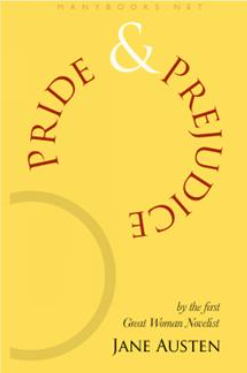





 Pride and Prejudice (Wheelers e-Audiobook)
by
Pride and Prejudice (Wheelers e-Audiobook)
by
 Pride and Prejudice (Wheelers e-Audiobook)
by
Pride and Prejudice (Wheelers e-Audiobook)
by
 Pride and Prejudice (Wheelers eBook)
by
Pride and Prejudice (Wheelers eBook)
by
Reference Shelf
Synopsis
Austen's best loved tale of love, marriage and society in class-conscious Georgian England still delights modern readers today with its comedy and characters. It follows the feisty, quick-witted Elizabeth Bennet as her parents seek to ensure good marriages for her and her sisters in order to secure their future. Through the irrepressible characters of Mr Collins and Mrs Bennet and the sensitivities and nuances of the relationship between Darcy and Elizabeth, Austen's skill and artistry as a writer shines.
Elizabeth Bennet
The novel’s protagonist. The second daughter of Mr. Bennet, Elizabeth is the most intelligent and sensible of the five Bennet sisters. She is well read and quick-witted, with a tongue that occasionally proves too sharp for her own good. Her realization of Darcy’s essential goodness eventually triumphs over her initial prejudice against him.
Fitzwilliam Darcy
A wealthy gentleman, the master of Pemberley, and the nephew of Lady Catherine de Bourgh. Though Darcy is intelligent and honest, his excess of pride causes him to look down on his social inferiors. Over the course of the novel, he tempers his class-consciousness and learns to admire and love Elizabeth for her strong character.
Jane Bennet
The eldest and most beautiful Bennet sister. Jane is more reserved and gentler than Elizabeth. The easy pleasantness with which she and Bingley interact contrasts starkly with the mutual distaste that marks the encounters between Elizabeth and Darcy.
Charles Bingley
Darcy’s considerably wealthy best friend. Bingley’s purchase of Netherfield, an estate near the Bennets, serves as the impetus for the novel. He is a genial, well-intentioned gentleman, whose easygoing nature contrasts with Darcy’s initially discourteous demeanor. He is blissfully uncaring about class differences.
Mr. Bennet
The patriarch of the Bennet family, a gentleman of modest income with five unmarried daughters. Mr. Bennet has a sarcastic, cynical sense of humor that he uses to purposefully irritate his wife. Though he loves his daughters (Elizabeth in particular), he often fails as a parent, preferring to withdraw from the never-ending marriage concerns of the women around him rather than offer help.
Mrs. Bennet
Mr. Bennet’s wife, a foolish, noisy woman whose only goal in life is to see her daughters married. Because of her low breeding and often unbecoming behavior, Mrs. Bennet often repels the very suitors whom she tries to attract for her daughters.
George Wickham
A handsome, fortune-hunting militia officer. Wickham’s good looks and charm attract Elizabeth initially, but Darcy’s revelation about Wickham’s disreputable past clues her in to his true nature and simultaneously draws her closer to Darcy.
Lydia Bennet
The youngest Bennet sister, she is gossipy, immature, and self-involved. Unlike Elizabeth, Lydia flings herself headlong into romance and ends up running off with Wickham.
Mr. Collins
A pompous, generally idiotic clergyman who stands to inherit Mr. Bennet’s property. Mr. Collins’s own social status is nothing to brag about, but he takes great pains to let everyone and anyone know that Lady Catherine de Bourgh serves as his patroness. He is the worst combination of snobbish and obsequious.
Literary Context Essay
When Jane Austen wrote Pride and Prejudice, the novel was still a relatively new type of literature. Unlike plays or poetry, English authors had only been publishing novels for about 100 years. Continue reading here...
Videos exploring the characters and themes of Pride and Prejudice as well as the writing style and world of Jane Austen can be found in the ClickView tab at the top of this page.
| Full Title | Pride and Prejudice |
| Date written | 1797-1812 |
| Place it was written | Bath, Somerset, England |
| Date published | 1813 |
| Literary period | Classicism/Romanticism |
| Climax | The search for Lydia and Wickham |
| Point of view | Third person omniscient |
 Pride and Prejudice : study guide - a text response guide to Jane Austen's Pride and Prejuduice
by
Pride and Prejudice : study guide - a text response guide to Jane Austen's Pride and Prejuduice
by
Top 50 Quotes You Need for Your Essay from Pride and Prejudice
You will need to create an Art of Smart account to access the link.
